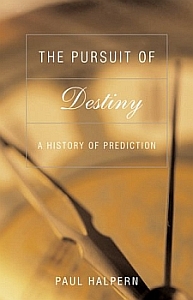The Pursuit of Destiny
A History of Prediction
By Paul Halpern

Many centuries ago, in their quest to unravel the future, mystics aspired to decipher the cries of birds, the patterns of the stars and the garbled utterances of oracles. Kings and generals would offer precious rewards for the information soothsayers furnished. Today, though predictive methods are vastly different from those of the ancient world, the advanced knowledge these techniques attempt to provide are ever more valued. From weather reports to stock market prediction, and from medical prognoses to social forecasting, superior insights about the shape of things to come have become increasingly prized commodities.
The Pursuit of Destiny documents the great strides science has made in prediction. Yet it also points out science's newly discovered limitations. Godel's theorem, Heisenberg's uncertainly principle, chaos theory and other mathematical insights have shown us how our knowledge of the world might never be complete because we, as observers, are integral parts of what we observe. Furthermore, as studies of strange topologies in general relativity have demonstrated, advanced information about the future—if possible—could lead to paradoxical situations. Today, scientists debate the meaning and possible resolution of such conundrums.
The Pursuit of Destiny examines the frontiers of both scientific and non-scientific images of tomorrow. Are you curious about what science has to say about Nostradamus, the Bible Code and the Oracle of Delphi? Have you ever wondered if it would be possible to communicate with—or even travel to—the future? Are you interested in what chaos and complexity theory say about predicting the stock market, and how these theories might be used to anticipate medical conditions such as strokes and seizures? Are you fascinated by cosmologists' attempts to understand the far future of the universe itself? The Pursuit of Destiny: A History of Prediction addresses these questions and more.
Buy this book
Praise for The Pursuit of Destiny
-
An evocative book that traces the predictive efforts of science and other disciplines from ancient Greece to the present.
—The Wall Street Journal -
Halpern has written a grand overview of the universe of scientific knowledge and its progression through the ages.
—Alice Wells, Weekly Press -
…you will find Paul Halpern's study of prediction fascinating.
—Infodad's Independent Reviews -
A readable survey of what modern science offers for predicting the future…
—Skeptic Bibliography -
A richly entertaining and informative work that draws heavily on the author's ample reserves of knowledge and wit.
—Rob Lightner, Amazon.com -
This incisive and revealing survey of prediction, both as it has been determined in the past and how we perceive it scientifically today, is a smartly compartmentalized analysis of an intriguing part of humankind. Halpern's book is an expressive and articulate testament to people's insatiable appetite to understand their existence, accept their limitations, and foresee their future.
—Dominic J. Caraccilo, Perspectives on Science and Christian Faith -
…Great book. I am enjoying it immensely.
—Martin Gardner, author of The Whys of a Philosophical Scrivener -
Halpern leads the reader on a wondrous trip through the landscape of science at the dawn of the 21st century as he explores the successes and limitations of the human ability to predict the future.
—Harry Shipman, author of Black Holes, Quasars and the Universe
Book Contents
- Introduction
- The Shape of Things to Come
- Chapter One
- Ancient Auguries
- Chapter Two
- The Lathe of Laplace: The Deterministic Future
- Chapter Three
- Light Flights: The Einsteinian Future
- Chapter Four
- Rolls of the Dice: The Quantum Future
- Chapter Five
- Change in the Weather: Chaos and Prediction
- Chapter Six
- The Body Electric: Complexity and Living Systems
- Chapter Seven
- The Roar of Tomorrow: Social and Technological Forecasting
- Chapter Eight
- Time's Terminus: Visions of the Far Future
- Conclusion
- Frontiers of Prediction
About the Author
Paul Halpern is a professor of physics at the University of the Sciences in Philadelphia. He is the author of more than a dozen highly acclaimed popular science books and is the distinguished recipient of multiple awards related to his work, in addition to having appeared on numerous television and radio programs, including Future Quest and The Simpsons 20th Anniversary Special. Learn more about him on his personal website.
